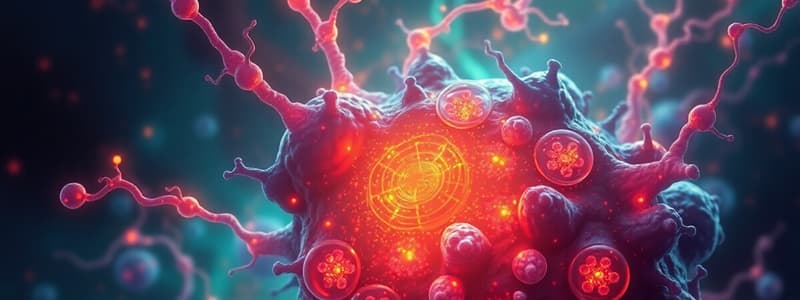Podcast
Questions and Answers
What is the main difference between prokaryotic and eukaryotic cells?
What is the main difference between prokaryotic and eukaryotic cells?
What are the main functions of the cell membrane?
What are the main functions of the cell membrane?
What are the two main types of cellular transport?
What are the two main types of cellular transport?
What is the difference between active and passive transport?
What is the difference between active and passive transport?
Signup and view all the answers
What is the difference between hypotonic, hypertonic, and isotonic solutions?
What is the difference between hypotonic, hypertonic, and isotonic solutions?
Signup and view all the answers
What are the two main types of cellular respiration?
What are the two main types of cellular respiration?
Signup and view all the answers
What is the main product of glycolysis?
What is the main product of glycolysis?
Signup and view all the answers
What is the main function of the Krebs cycle?
What is the main function of the Krebs cycle?
Signup and view all the answers
Where does the electron transport chain take place?
Where does the electron transport chain take place?
Signup and view all the answers
What is the main function of photosynthesis?
What is the main function of photosynthesis?
Signup and view all the answers
What are the two main stages of photosynthesis?
What are the two main stages of photosynthesis?
Signup and view all the answers
What are the main products of the light-dependent reactions?
What are the main products of the light-dependent reactions?
Signup and view all the answers
What are the four main phases of the cell cycle?
What are the four main phases of the cell cycle?
Signup and view all the answers
What are the four main phases of mitosis?
What are the four main phases of mitosis?
Signup and view all the answers
What is the difference between mitosis and meiosis?
What is the difference between mitosis and meiosis?
Signup and view all the answers
What are some examples of adaptations plants use to avoid photorespiration?
What are some examples of adaptations plants use to avoid photorespiration?
Signup and view all the answers
Study Notes
Honors Biology 1st Semester Exam Study Guide
-
Final Exam:
- Dates: December 16th
- Format: 75 questions
- Time allotted: 1 hour plus 30 minutes extra
- Weight: 15% of grade
-
Study Resources:
- Notes
- Past study guides
- Textbook
- Worksheets/Assignments
- Quizlet
- Gimkit
- Quizizz
- Previously posted YouTube videos
- Email questions to [email protected]
Unit 1: Foundations of Life
- Textbook: MDHS Honors Biology Textbook, Chapter 1
-
Experimental Design:
- Hypothesis
- Independent vs. dependent variables
- Controls
- Hypothesis vs. Theory vs. Law
- Characteristics of Life
Unit 1: Chemical Basis of Life
- Textbook: MDHS Honors Biology Textbook, Chapter 2
-
Atoms & Elements:
- Protons, neutrons, electrons
- Charges of atomic particles
- Atomic number
- Mass number
- Valence electrons
-
Compounds:
- Ionic bonding
Unit 2: Cell Structure and Function
- Textbook: MDHS Honors Biology Textbook, Chapter 3
- Cell Structure and Function Lecture Notes
- Cell Theory History: Hooke, Leeuwenhoek, Schwann, Schleiden, Virchow
- Cell Theory
-
Prokaryote vs. eukaryote
- Similarities
- Differences
-
Animal cell vs. plant cell
- Organelles
- nucleus, ribosomes, cell wall, nucleolus, cell membrane, mitochondria, chloroplast, Golgi apparatus, rough/smooth endoplasmic reticulum, centrioles, lysosomes, nuclear envelope, cytoskeleton, plasma membrane
- Organelles
-
Plasma Membrane
- Characteristics
- Components (phospholipids and proteins)
-
Transport:
- Active vs. Passive
- Diffusion
- Osmosis
- Facilitated diffusion
- Active transport
- Bulk transport (endocytosis & exocytosis)
-
Solutions:
- Solute
- Solvent
- Hypertonic vs. hypotonic vs. isotonic
- Definitions
- Examples
Unit 3: Cellular Respiration
- Textbook: MDHS Honors Biology Textbook, Chapter 4
-
Cellular Respiration: Covers “Cellular Energetics” Lecture Notes
- Metabolism
- Exergonic vs. endergonic reactions
- Importance of ATP
Unit 3: Photosynthesis
- Textbook: MDHS Honors Biology Textbook, Chapter 5, "Cellular Energetics" lecture notes
- Autotrophs vs. heterotrophs
- Overall Equation
-
Leaf structure
- Stomata
- Plant pigments
- Chlorophyll
- Carotenoids
-
Oxidation-reduction
- What is oxidized?
- What is reduced?
- Light-dependent reactions
Unit 4: The Cell Cycle
- Textbook: MDHS Honors Biology Textbook, Chapter 6, Cell Cycle Lecture Notes
- Chromosomes
- Interphase (G1, S, G2)
- Mitosis (Prophase, metaphase, anaphase, telophase)
- Cytokinesis
- Meiosis (I & II)
- Differences between mitosis & meiosis
- Haploid/diploid
- Karyotypes
- Cancer
-
Cell Cycle Regulation
- P53
- CDK
- Kinases
Studying That Suits You
Use AI to generate personalized quizzes and flashcards to suit your learning preferences.
Related Documents
Description
Prepare for your 1st semester exam in Honors Biology with this comprehensive study guide. Covering key concepts from Chapters 1 and 2 of the MDHS Honors Biology Textbook, you'll explore experimental design, the chemical basis of life, and the characteristics of living organisms. Utilize various resources to optimize your study time and ensure success on your final exam.




